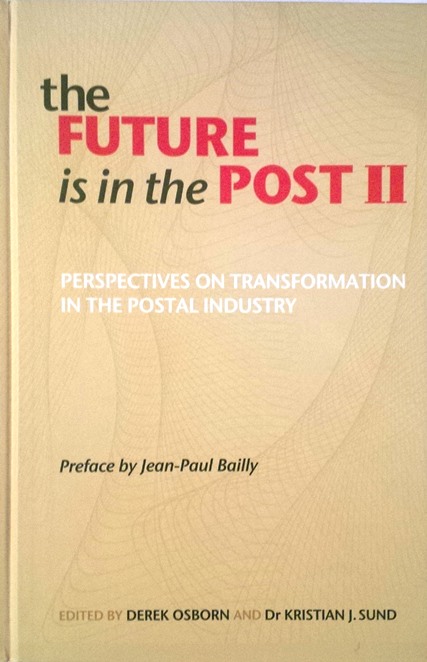- Home ›
- Data Protection
Data Protection
Data-driven postal services: The medium is the message

At A Glance
Postal services are now data-driven, not item-driven, placing data protection at the core of new postal service provision.This article was written by Walter Trezek and published in The Future is in the Post II: Perspectives on transformation in the postal industry, Ed. Derek Osborn & Kristian Sund, 2011.
- Continue to Part 2: The Medium is the Message
The Medium is the Message: Mail and Postal Service Provision in a Global Village
As letter post provision increasingly becomes the ugly sister to digital communication services, the future role of postal services in providing a global communications infrastructure will be determined by the extent to which postal service provision is shifted into the internet.
This involves adopting a new and widened concept of Universal Service, securing the position of designated postal operators as Trusted Third Parties, acting as gatekeepers entrusted with safeguarding the privacy and integrity of communication between senders and recipients.

All change...
There is no doubt that information and communication technologies (ICT) are fundamentally changing the way we interact.
Postal service provision, the global nature of the postal network, the legal framework for postal services, relationships between postal service providers, as well as designations by global postal community members - all must adapt, restructure or risk being replaced.
Access to information is vital. Yet the form of communication itself has become even more important; today’s professionals need to be connected everywhere, at all times. As communication devices become smarter, interconnectivity is no longer an option, it is a must.
Marshall McLuhan, originator of the phrase “the medium is the message”, predicted that new electronic media would bring the world closer together, to create what he refers to as “a global village”.
The internet and its most important features – killer applications such as email, social and mobile media, ad-selling and ad-serving - are, without doubt, the fulfillment of his prophecy. People scattered across the globe now congregate together in cyberspace to share ideas and information.
Where does this leave postal services?
The global nature of digital media and its ubiquitous character are in some ways similar to what it might have been like to live in a small village several centuries ago.
However, unlike living in a small community in which social norms and interactions create the foundations of civil society, today´s global village lacks vital aspects of self-regulation. Today’s gossip, once the glue of social intercourse, can now become a permanent reputational stain, one that no longer can be eradicated. It is accessible anywhere in the world and can be readily found in less than a second. If only it were just gossip.
Data is a commodity
Information as such becomes a commodity, one traded by companies who take advantage of all the available data. They use tools to exploit sites filled with private information, stored and intended only to be accessed by a limited and preselected group of people, usually innocent citizens.

This data includes personal information such as food preferences, financial, credit and health ratings, credit card use, mobile phone tracking patterns, digital dating profiles, communication content of mail services, automatic messages indicating absences from home or the workplace, recent and past photos, socio-demographic data, not to mention web shopping and surfing patterns.
Fine, when this means consumers are presented with information and product offerings which interest them.
Not fine when, after data collection, collation and analysis, they are judged to be a risk and subjected to higher mortgage interest rates, refused loans, charged higher car insurance premiums, etc.
Everyone on the web has something to hide!
The conflict is clear: we want information to flow openly, for this is essential to a free society. Yet we also want to have some level of control over the information that circulated about us and have our data protected, for this is also essential to our personal freedom.

Before putting our trust in goods, services, and particularly people, we need information which allows us to determine whether our trust is justified.
Maybe future generations will no longer expect much privacy at all? We may even envision a future in which we can finally be honest about ourselves, or completely dishonest.
Maybe our future will be much less free, Orwellian, with society both oppressive and uncontrollable?
Where reputations can be destroyed in an instant and past mistakes eternally haunt us and destroy future opportunities.
Once trust has been established, it becomes ever more important that this trust is neither violated nor compromised. Thus it is essential that we have the means to establish trusted common ground upon which information and communications can be securely exchanged between the parties involved. Data protection is key to this trust.
Splitting postal service provision – logistics vs. mail services
Traditional postal service provision developed to meet the need for a secured infrastructure for the exchange of physical postal items – letter post items up to 2 kg in weight, and parcel post items up to 31.5 kg.
A Universal Service was created to ensure global access, by designating national providers for each and every country worldwide. The content of each item was legally safeguarded, with any breach of the privacy or integrity of a postal item by postal service personnel being punished by law, globally.
The postal infrastructure is the communications backbone for governments worldwide, allowing them to reach all of their citizens, wherever they are. In most countries, postal addresses form the basis for advanced government. Up until only recently, access to postal networks was as important as access to digital and mobile communications is now.
Letter post provision emerged in the 19th century. One might say that it was an indicator of society’s stage of development. Fundamental human rights, such as the integrity and privacy of a letter post item, were enshrined in every nation’s postal law and driven by the convention of the Universal Post Union (UPU).
A society’s
development and wealth creation could be directly measured by the growth in volumes
of letter post items and communications. Compulsory daily delivery became the
backbone of economic growth, providing the reliable infrastructure to send and
receive transactional mail.

Even the development of western democratic society can be linked to postal services - they provided the necessary delivery network for publications and therefore freedom of speech.
Parallels with today’s world are obvious.
The overwhelming success of email, and even more so social and mobile media, have lead to a decline in physical mail volumes and – even more importantly – a substitution of postal service provision by other means of communication.
In the European Union it is governments themselves who have driven this development, by pushing new digital service provision which enables them to communicate in a secured and trusted way with their own citizens.
It is true that posts distinguish between parcel post services and letter mail services. Some posts see in parcel post services a focus for future business activities. This part of the traditional postal business is increasingly becoming an integrated logistics offering, driven by e-commerce and distance selling.
The market for parcel post items is fully liberalized, and over the last decade national incumbents have lost most of this market to competitors and global consolidators.
However, the extension of postal parcel provision leads to integrated, global logistics offerings based on an international parcel network and integration into customs, freight networks and payment solutions globally.
(Article continues here....)
- Home ›
- In the News
Does this article cover a topic relevant to your business? Access the CLS Business Lounge for the market intelligence you need to stay ahead of the crowd. Find out more







